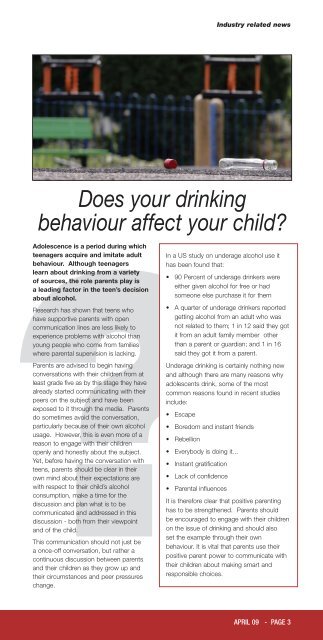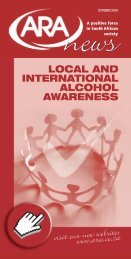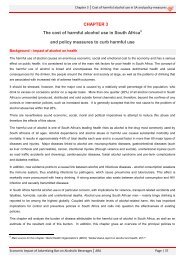Download PDF - ARA
Download PDF - ARA
Download PDF - ARA
Create successful ePaper yourself
Turn your PDF publications into a flip-book with our unique Google optimized e-Paper software.
Industry related news<br />
Does your drinking<br />
behaviour affect your child<br />
Adolescence is a period during which<br />
teenagers acquire and imitate adult<br />
behaviour. Although teenagers<br />
learn about drinking from a variety<br />
of sources, the role parents play is<br />
a leading factor in the teen’s decision<br />
about alcohol.<br />
Research has shown that teens who<br />
have supportive parents with open<br />
communication lines are less likely to<br />
experience problems with alcohol than<br />
young people who come from families<br />
where parental supervision is lacking.<br />
Parents are advised to begin having<br />
conversations with their children from at<br />
least grade five as by this stage they have<br />
already started communicating with their<br />
peers on the subject and have been<br />
exposed to it through the media. Parents<br />
do sometimes avoid the conversation,<br />
particularly because of their own alcohol<br />
usage. However, this is even more of a<br />
reason to engage with their children<br />
openly and honestly about the subject.<br />
Yet, before having the conversation with<br />
teens, parents should be clear in their<br />
own mind about their expectations are<br />
with respect to their child’s alcohol<br />
consumption, make a time for the<br />
discussion and plan what is to be<br />
communicated and addressed in this<br />
discussion - both from their viewpoint<br />
and of the child.<br />
This communication should not just be<br />
a once-off conversation, but rather a<br />
continuous discussion between parents<br />
and their children as they grow up and<br />
their circumstances and peer pressures<br />
change.<br />
In a US study on underage alcohol use it<br />
has been found that:<br />
• 90 Percent of underage drinkers were<br />
either given alcohol for free or had<br />
someone else purchase it for them<br />
• A quarter of underage drinkers reported<br />
getting alcohol from an adult who was<br />
not related to them; 1 in 12 said they got<br />
it from an adult family member other<br />
than a parent or guardian; and 1 in 16<br />
said they got it from a parent.<br />
Underage drinking is certainly nothing new<br />
and although there are many reasons why<br />
adolescents drink, some of the most<br />
common reasons found in recent studies<br />
include:<br />
• Escape<br />
• Boredom and instant friends<br />
• Rebellion<br />
• Everybody is doing it...<br />
• Instant gratification<br />
• Lack of confidence<br />
• Parental influences<br />
It is therefore clear that positive parenting<br />
has to be strengthened. Parents should<br />
be encouraged to engage with their children<br />
on the issue of drinking and should also<br />
set the example through their own<br />
behaviour. It is vital that parents use their<br />
positive parent power to communicate with<br />
their children about making smart and<br />
responsible choices.<br />
APRIL 09 - PAGE 3




